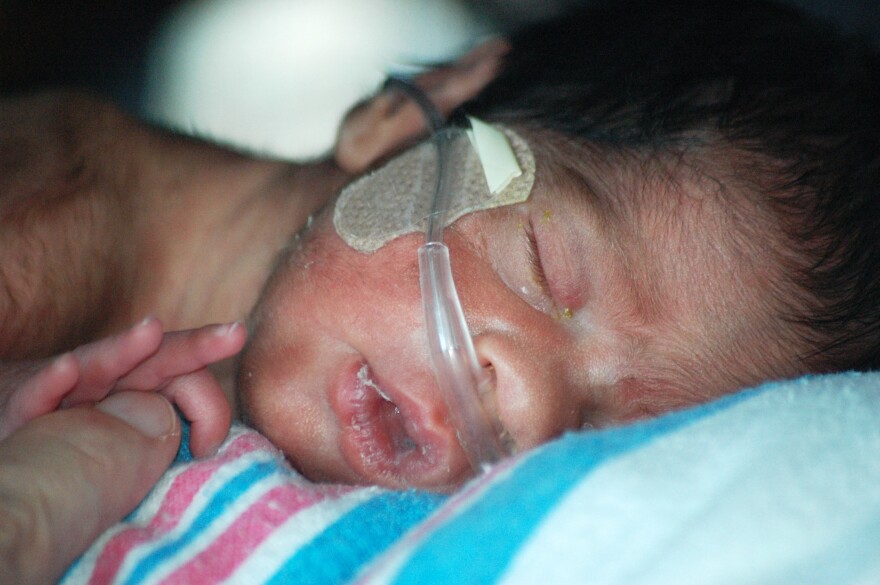In order to help babies that are born too early, you’ve got to experiment on fetal tissue. At least that’s what scientists say. A House panel investigation of this kind of research has raised its profile. We went to the University of New Mexico Hospital to find out how fetal tissue is used.
Pediatrics Professor Dr. Robin Ohls stood in one of UNM Hospital's Newborn Intensive Care Unit's, or NICU for short. The babies in this part of the hospital are tiny - born too early, sometimes after only 6 months in the womb. She described the bleeping sounds in the room: "In the background the monitors are alarming constantly, but for each baby intermittently."
There are 52 babies total in the NICUs. Plus parents and grandparents wearing gowns over their street clothes, and nurses in scrubs. "All the caregivers are here in the hallway also kind of listening in," she said, "so there’s always a lot of people ready to respond to any of the alarms if there’s something really serious that occurs."
Natural light filtered in through the windows, and the babies were mostly asleep, swaddled in hospital blankets and wearing little pastel hats. Something that looked like a car seat with a premature infant in it moved up and down in a zig-zag pattern. "There are special baby seats. You can program them to rock them in all different various directions. So that’s the wave that baby’s doing right there," Ohls explained. "There’s one that’s a washing machine, too. And then there’s a car ride, too."
Dr. Ohls is also a neonatologist who does clinical work and research. And for 20 years here, she and other researchers have been looking for ways to avoid the illnesses and injuries that afflict infants born at the limits of viability—so after just 22, 23 or 24 weeks (as opposed to the full 40) inside their moms. Premature babies can have problems with their brains, hearts, lungs or digestive tracts, for instance. Researchers test treatments on fetal tissue.
The lab works with an abortion clinic in Albuquerque, Southwestern Women’s Options. That’s where they get the fetal tissue that’s been donated by patients after abortions. They say no money's changed hands, but both UNM and the clinic are being investigated by a congressional panel that’s questioning the legality and morality of this work.
"All of it is done with great respect," Ohls said. "It’s a great opportunity for us to ultimately do a better job in taking care of just the tiniest babies."
She said one of the biggest risks for babies who are born early is that their brains might not develop correctly. The lab was able to test growth factors for brain cell development on donated tissue, and then do clinical trials on babies in the NICU. So far, when they test those children later in life, results look good.
"Those kids that were treated when they were tiny babies in the hospital, they were better at two years," she said. "They were even better than the ones that didn’t get it at four years, and now they’re even better at six years."
Sometimes, the researchers are lucky enough to see those positive outcomes first-hand. Conra Backstrom Lacy is a neonatal nurse who’s been at UNMH for 40 years. Lately, her job has been to evaluate kids who were born too early as they grow. And their parents, she said, are grateful for the advancements in care.
"Families have said they told me, 'He wouldn’t be able to walk, he wouldn’t be able to sit up, he wouldn’t be able to do anything. And look at him,' " Lacy said. "You know, it’s like—oh, you’re giving me goosebumps just thinking about it—but these families are so appreciative."
It’s rewarding, she said. All of the physicians in the room agreed. And when a woman chooses to donate fetal tissue, Lacy added, she’s contributing to research that wouldn’t happen any other way. "We can’t do research on grownups and have it tell us anything about the unborn baby," she said. "We can’t do research on living babies that would be harmful to them."
Lacy said she’s pleased and proud of the way care has improved for premature infants over the decades. And that fetal tissue research, she finished, is an essential part of that work.
*****
See the first story in this series: The debate on fetal tissue research.
Public Health New Mexico is funded by the W.K. Kellogg Foundation and the Con Alma Health Foundation.





